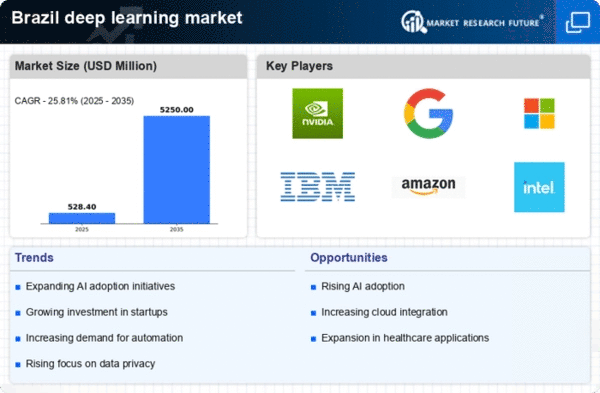Rising Demand for Automation
The deep learning market in Brazil experiences a notable surge in demand for automation across various sectors. Industries such as manufacturing, finance, and retail are increasingly adopting deep learning technologies to enhance operational efficiency and reduce costs. According to recent data, the automation market in Brazil is projected to grow at a CAGR of 25% through 2027, indicating a strong inclination towards integrating advanced technologies. This trend is likely to drive investments in deep learning solutions, as businesses seek to leverage machine learning algorithms for predictive analytics and process optimization. Consequently, the deep learning market is poised to benefit from this growing demand, as companies strive to remain competitive in an evolving digital landscape.
Expansion of Data Availability
The availability of vast amounts of data is a significant driver for the deep learning market in Brazil. With the rise of digital platforms and IoT devices, data generation has increased exponentially. This influx of data provides a rich resource for training deep learning models, enabling more accurate predictions and insights. Reports indicate that data generation in Brazil is expected to reach 2.5 zettabytes by 2025, creating ample opportunities for businesses to harness deep learning technologies. As organizations recognize the value of data-driven decision-making, the deep learning market is likely to see accelerated growth, as companies invest in data analytics and machine learning capabilities.
Government Initiatives and Support
Brazilian government initiatives aimed at fostering technological innovation play a crucial role in the deep learning market. Policies promoting research and development in artificial intelligence are being implemented, with funding allocated to projects that utilize deep learning techniques. For instance, the Brazilian Ministry of Science, Technology, and Innovations has launched programs to support AI research, which could potentially lead to a 30% increase in AI-related projects by 2026. Such governmental backing not only encourages local startups to explore deep learning applications but also attracts foreign investments, thereby enhancing the overall growth of the deep learning market in Brazil.
Advancements in Hardware Capabilities
The deep learning market in Brazil is significantly influenced by advancements in hardware capabilities, particularly in graphics processing units (GPUs) and specialized AI chips. These technological improvements enable faster processing of complex algorithms, which is essential for training deep learning models. As hardware becomes more accessible and affordable, Brazilian companies are increasingly investing in high-performance computing resources. This trend is expected to boost the deep learning market, as organizations can now implement more sophisticated models that require substantial computational power. The ongoing evolution of hardware technology is likely to facilitate innovation and enhance the overall effectiveness of deep learning applications across various sectors.
Growing Interest in Natural Language Processing
Natural Language Processing (NLP) is gaining traction within the deep learning market in Brazil, driven by the increasing need for effective communication tools. Businesses are recognizing the potential of NLP applications in customer service, sentiment analysis, and content generation. The Brazilian market for NLP is projected to grow by 40% over the next five years, reflecting a strong demand for solutions that can process and analyze human language. This growing interest in NLP not only enhances user experiences but also drives the adoption of deep learning technologies, positioning the deep learning market for substantial growth as companies seek to improve their engagement strategies.
















